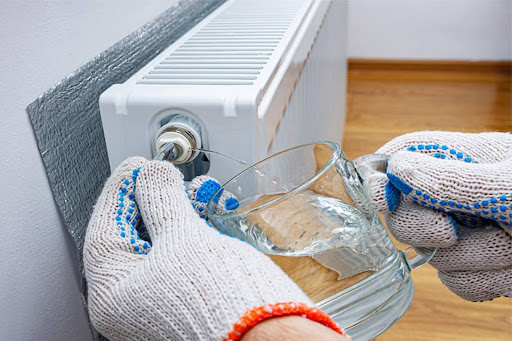Is your radiator not heating up properly? It might be time to bleed it! Discover why you should bleed a radiator to improve efficiency, save energy, and keep your home warm all winter long.
Bleeding a radiator is a straightforward task that can significantly improve the efficiency of your heating system. By releasing trapped air, you allow hot water to circulate freely, ensuring your home stays warm and your energy bills stay low.
This guide will walk you through when and why bleeding a radiator is necessary, how to do it safely, and the advantages of regular maintenance.
Understanding Radiator Function
Radiators work by circulating hot water through a series of pipes and panels, transferring heat to your rooms. Over time, air can become trapped in the system, preventing hot water from filling the radiator completely. This trapped air leads to cold spots and reduces the radiator’s efficiency.
When Should You Bleed a Radiator?
It’s essential to know the signs that indicate your radiator needs bleeding:
- Uneven Heating: If the top of the radiator is cold while the bottom is warm, trapped air is likely the culprit.
- Strange Noises: Gurgling, banging, or clanking sounds suggest air is circulating within the system.
- Slow Heating: Radiators taking longer than usual to warm up may need bleeding.
- Annual Maintenance: It’s advisable to bleed your radiators at least once a year, preferably before the colder months set in.
Why Bleed a Radiator?
Bleed a radiator offers several benefits:
- Improved Efficiency: Removing trapped air allows hot water to circulate freely, ensuring consistent heating.
- Energy Savings: Efficient radiators require less energy to heat your home, reducing utility bills.
- Extended Lifespan: Regular maintenance prevents corrosion and prolongs the life of your heating system.
- Enhanced Comfort: Evenly heated rooms provide a more comfortable living environment.
How to Bleed a Radiator: Step-by-Step
Bleeding a radiator is a simple DIY task. Here’s how to do it:
- Turn Off the Heating: Ensure your heating system is off and the radiators are cool to prevent burns.
- Locate the Bleed Valve: This is usually at the top of the radiator, on one side.
- Prepare Your Tools: You’ll need a radiator key (available at hardware stores), a cloth or small container to catch water, and an old towel to protect your floor.
- Open the Valve: Insert the radiator key into the valve and turn it slowly counterclockwise. You’ll hear a hissing sound as air escapes.
- Close the Valve: Once water starts to trickle out steadily, turn the key clockwise to close the valve.
- Check the Boiler Pressure: After bleeding, ensure your boiler’s pressure is within the recommended range (usually between 1 and 1.5 bar).
- Turn the Heating Back On: Switch your heating system back on and check that the radiator is heating evenly.
Key Takeaways and Tips
- Safety First: Always ensure the heating system is off and radiators are cool before bleeding.
- Regular Checks: Incorporate radiator bleeding into your annual home maintenance routine.
- Monitor Boiler Pressure: After bleeding, check the boiler pressure and adjust if necessary.
- Use the Right Tools: A radiator key is essential; however, some modern radiators may require a flathead screwdriver.
- Seek Professional Help if Needed: If problems persist after bleeding, consult a qualified heating engineer.
Conclusion: Keep Your Home Warm and Efficient
Bleeding a radiator is a simple yet effective way to maintain your heating system’s efficiency. By releasing trapped air, you ensure that your radiators heat evenly, providing a comfortable environment and reducing energy costs.
Regular maintenance, including bleeding your radiators, is essential for the longevity of your heating system. It’s a quick task that can save you money and prevent more significant issues down the line.
So, the next time you notice a cold spot or hear unusual noises from your radiator, don’t hesitate to bleed it. Your home and your wallet will thank you.

